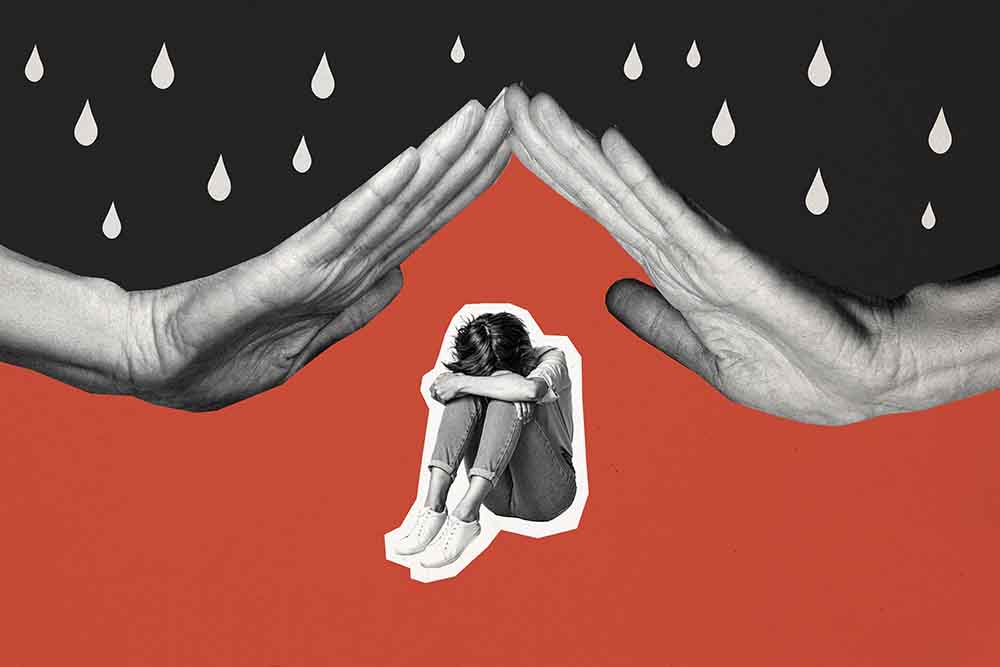The distinction between sound mental health and mental health disorders isn't always evident, but sometimes the solution needs to take these differences into account. Does having a fear of public speaking, for instance, indicate a mental illness or just a case of nerves? Or, at what point does shyness turn into social phobia? The general well-being of your thoughts, emotions, and behaviour is known as mental health. This mental functioning can occasionally be seriously disrupted in individuals. When patterns or changes in thought, feeling, or behaviour cause distress or interfere with a person's capacity to function, it may indicate a mental disorder.

A mental illness could impair your ability to –
• Maintain your personal and family relationships
• Operate in social situations
• Perform at school or at work
• Learn at a level expected out of your age and IQ
• Engage in further significant activities
The definition of mental health issues is also influenced by societal expectations and cultural standards. To assess whether a behaviour is normal or whether it becomes disruptive, there is no universally accepted metric. In one society, anything that is considered normal could be a reason for alarm in another.
Dr Ruhi Satija, Consultant Psychiatrist, Therapist explains that mental health is just as vital as physical health, yet many of us can’t tell when something is ‘off’ emotionally or mentally. Most people would describe such feelings as mere stress or mood swings, never realising it could be signs of a developing mental health concern. Here’s a straightforward guide to understanding common mental health concerns, their first signs, and how to seek help.

Recognising The First Signs Of Depression
Depression is not just about feeling sad. It’s a persistent state affecting how you feel, think, and function daily. Watch out for these signs:
• Feeling sad or empty from within for most of the day, nearly every day
• Loss of interest in activities that were once enjoyable
• Sleeping too little or too much; difficulty in sleeping or excessive sleeping
• Changes in appetite; markedly reduced appetite or increased cravings
• Inability to concentrate and get even mundane tasks done
• Hopelessness, guilt, or feeling inadequate
• Thoughts of self-harm or not wanting to be around people anymore
What You Can Do
If these symptoms continue for two weeks, you should talk to somebody—start with a friend, family member, or even a mental health professional. Therapy and lifestyle changes will help you.

Bipolar Disorder
Bipolar disorder causes extreme mood swings, varying from periods of intense energy and happiness (mania) to deep sadness (depression). Watch out for these signs:
• Feeling extremely happy or ‘on top of the world’ without a rational reason
• Talking too fast, thinking too fast, or jumping between ideas
• Engaging in impulsive acts, like overspending or dangerous activity
• Sleeping less and still feeling energetic
• Depression
• Feeling tired, uninterested, or unmotivated
• Crying easily or feeling hopeless
What You Can Do
Monitor these mood patterns in a diary and discuss them with a psychiatrist. A combination of medicine and therapy is highly effective.
Anxiety
Anxiety doesn’t just mean you’re worrying; it’s a powerful feeling of fear or dread with no apparent cause. Look out for these signs:
• Consistent worrying about minor things that most people don't even think about twice
• Feeling restless or being on edge
• Physical symptoms like racing heart, sweating, trembling, or shortness of breath
• Avoiding places or situations that might trigger anxiety, like crowds or public speaking
• Sudden episodes of intense fear (panic attacks) where you feel like you’re losing control
What You Can Do
Learn simple calming techniques like deep breathing or counting backwards from 100. Consult a therapist for long-term strategies, such as cognitive-behavioral therapy (CBT).

Obsessive-Compulsive Disorder (OCD)
OCD involves unwanted thoughts (obsessions) and repetitive actions (compulsions) that are performed to reduce anxiety. These are the signs to look out for:
• Fear of germs leading to constant handwashing or cleaning
• You find yourself repeatedly checking things like locks or appliances even though you know they are alright
• You feel something bad will happen if you don't perform certain rituals
• You spend several hours in a day engaging with these behaviours, which affect your routine.
What You Can Do
Understand that OCD is not ‘just a habit.’ Talk to a professional who can help with therapy and, if needed, medication.
Post-Traumatic Stress Disorder (PTSD)
It happens after experiencing or witnessing a traumatic event, such as an accident, abuse, or natural disaster. Watch out for these signs:
• Reliving the trauma through flashbacks or nightmares
• Avoiding places, people, or situations that remind you of the event
• Feeling jumpy, irritable, or always on high alert
• Emotional numbing or feeling cut off from the world
What You Can Do
PTSD is treatable with specific therapies such as EMDR (Eye Movement Desensitisation and Reprocessing). Seek help if these symptoms persist.

General Tips For Identifying Mental Health Issues
Listen to your instinct: If something doesn't feel right, don't brush it off. Early warning signs are subtle but significant.
Talk about it: Discuss how you feel with someone that you’re completely comfortable with.
Look for patterns: If these feelings or behaviours persist for weeks or interfere with your life, it's time to seek help.
Ask for help: Therapy and medication are not signs of weakness—they are just tools to help you live a better life.